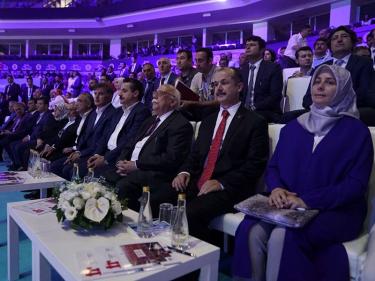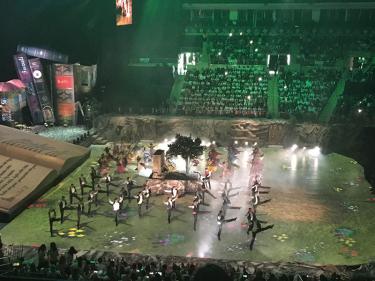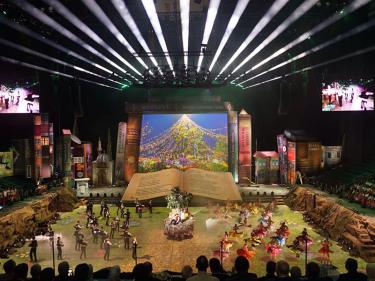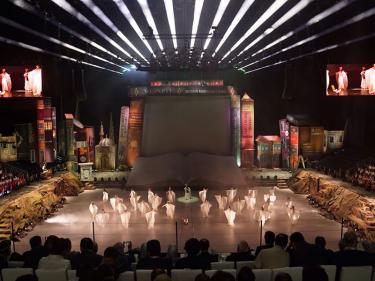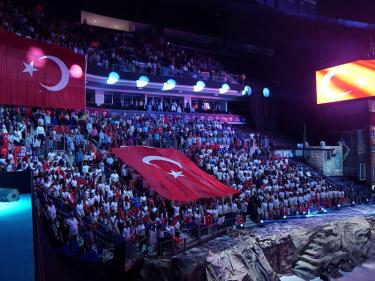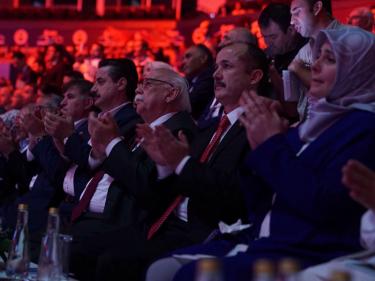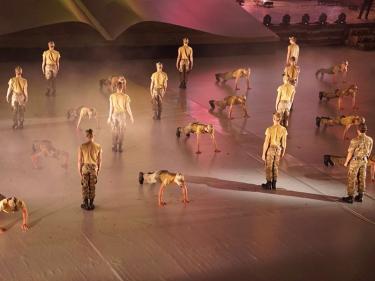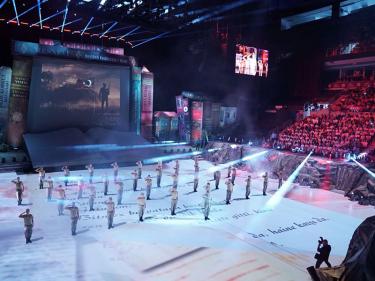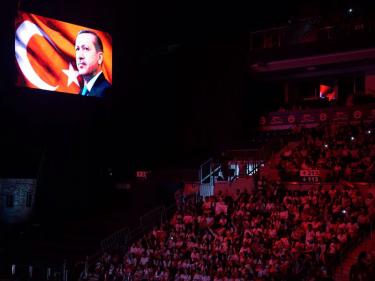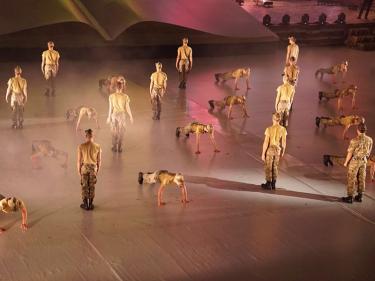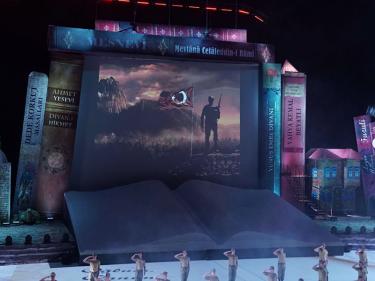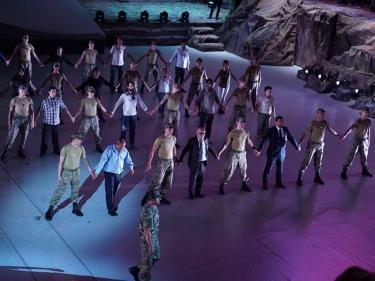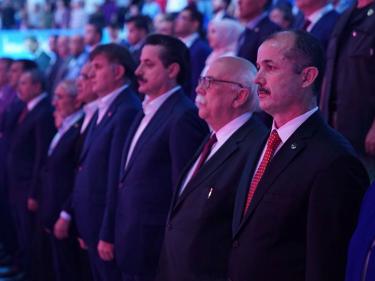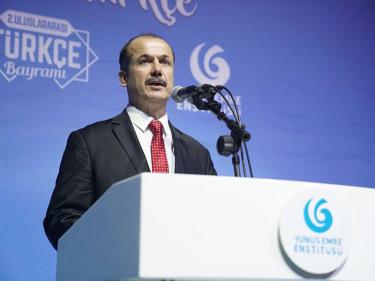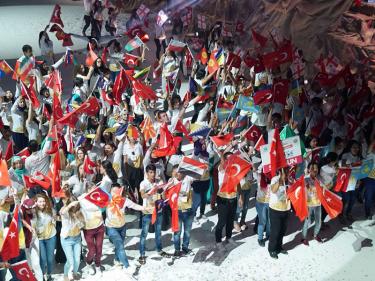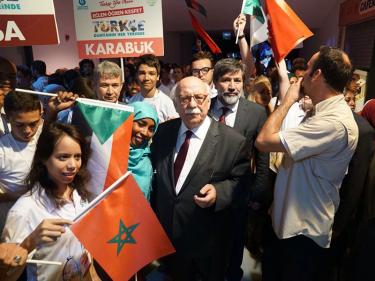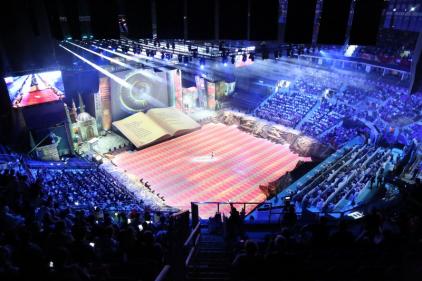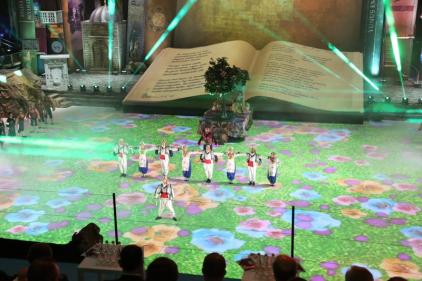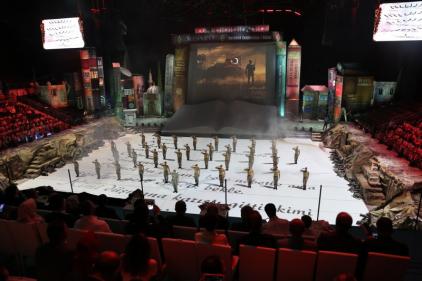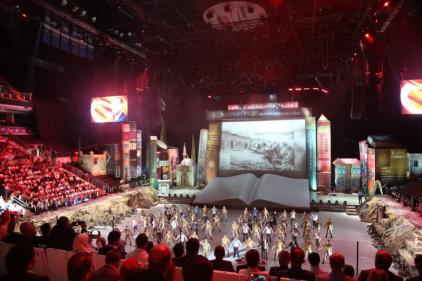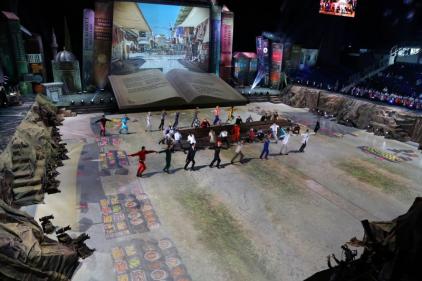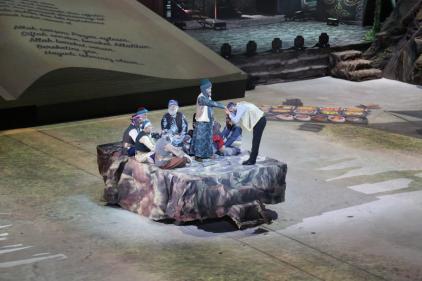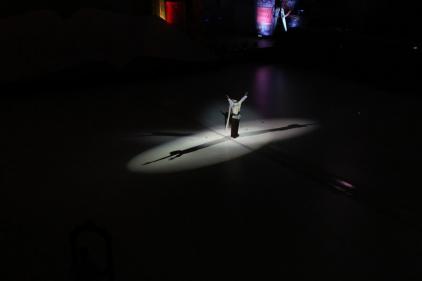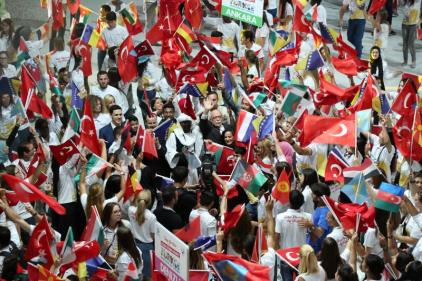A Magnificent Turkish Festival in Ülker Arena
The second “Turkish Festival” event was organized by Yunus Emre Institute at İstanbul Ülker Sports Arena under the auspices of The Presidency.
540 students from 46 countries were hosted in 16 different Turkish cities by the Yunus Emre Institute Turkish Summer School, which organized the Turkish Festival as the culmination of the summer program.
The “Man and Turkish” performance by the cultural envoys in İstanbul Ülker Sports Arena delivered a great message to the world. Through their shows, students sent the world “Turkish” messages of peace, friendship, and love.
The first Turkish festival, organized last year under the auspices of the President Recep Tayyip Erdoğan and attended by several ministers, had brought together 500 students from 60 countries again in İstanbul Ülker Sports Arena on August 22.
The first part of the foreign student performance “Man and Turkish” consisted of the period of a person’s life from birth to military service. Caucasian, Balkan, and Anatolian folk dances depicted the youthful days of birth, childhood, primary school, leading to the wedding day.
The part of the show on the wedding day was a sentimental moment. The recent terror attack that targeted a wedding in Gaziantep was condemned through messages projected at the screen. The messages read: “We remember with grace our citizens who were martyred in the atrocious terror attack in Gaziantep. May no other wedding be cut short, no joy marred by pain.”
SERGEANT ÖMER HALİSDEMİR BRINGS THE AUDIENCE TO TEARS
The final act of the first chapter of the “Turkish Festival” dealt with the “military service” period. The act started with the recital of a father’s letter to his soldier son. The images of President Recep Tayyip Erdoğan’s call to the public on the night of July 15 were followed with the historic scenes of the people’s defense of their country, with a voiceover of the poem “Prayer” in the President’s own voice.
Great applause erupted as some soldiers marched under the screen and part of the audience followed them on stage. The leading sergeant stepped forth and said “I am Sergeant Ömer Halisdemir! Your orders, sir!” as the entire audience, including the guests of honor, rose in applause with tears welling in their eyes, and the names of July 15 Martyrs were read. Following the act on “military service” period, cries of Takb?r led to a moment of silence for the martyrs, and Independence March was proudly recited in unison.
NABİ AVCI: THE BEST RESPONSE TO TERROR
Culture and Tourism Minister Prof. Dr. Nabi Avcı said that the Turkish Festival was the best and most meaningful response to terror, and added: “At the moment of the world’s continuous need for calls for love, peace, and friendship, you are performing a holy duty by calling out with love and peace under the theme Man and Turkish. This call is the call of Yunus Emre through the ages, saying ‘Come, let us all be friends for once / Let us make life easy on us.’ Come, let’s all be friends for once, let’s make life easy on us, the world shall be left to no one.”
Culture and Tourism Minister Avcı noted that Turkish is a language of a people that has built great civilizations, is one the top languages in the world in prevalence and use, has borrowed words from all geographies through which it has flowed like a strong river, has fermented these with its own color and harmony, and stamped its seal on its words and structure.
Avcı drew attention to the fact that Turkish is an established and strong language, and with its rich vocabulary, is strong enough to shoulder Turkish history, culture, art, and civilization.
Avcı called Turkish a language of the heart spoken by the Akhmet Yassawis, Yunus Emres, and Sarı Saltıks of the world who believe that furnishing the world with love and peace is the greatest virtue. He added:
“Our language is a language of a people whose maxim is to make thrive, not make war, to sow seeds of love, compassion, and mercy, not seeds of hate. Turkish is the language of saints and alıps who, through the centuries, struggled to spread peace, trust, tranquility, and justice to the world through the path of righteousness and truth. Dear students who came here like cranes from seven corners, you are no longer guests but children of this country.”
Avcı noted that Turkish Festival is being celebrated despite acts of terror, and finished by saying: “I am grateful to you esteemed students for your thirst for knowledge on our culture and language, which led you to fearlessly stand with us in the streets to defend democracy and Turkey in these fateful days.”
ŞEREF ATEŞ: AN IMPORTANT MESSAGE
Yunus Emre Institute President Prof. Dr. Şeref Ateş reminded the audience that Yunus Emre Institute has been working ceaselessly since 2009 to publicize Turkey, Turkish language, and Turkish culture, and to develop relations of Turkey with other countries through cultural exchange at 45 Turkish Culture Centers and 80 points of contact.
Institute President Prof. Dr. Ateş said: “The most distinguished element of our intense cultural diplomacy efforts to increase our friends abroad and multiply our lovers is without doubt the teaching of Turkish. As the Yunus Emre Institute, we try to teach Turkish and openly describe our people and ancient cultural values. In fact, unlike those who hide behind secret agendas and make the Turkish language a part of their dark scenarios, the Yunus Emre Institute, foremost through the strong support of our President, and resources of our state and honest prayers of our people, strives to properly teach Turkish in all corners of the world. One of the most important segments of these activities is our Institute’s annual Turkish Summer School. It is a strong message that, despite the coup attempt, 540 Cultural Envoys from 46 countries have accepted our invitation to come to our country and embrace our people.”
Prof. Dr. Şeref Ateş continued by saying:
“Our country’s success is the message sent out to the world from İstanbul—the capital of empires, the ancient city master Necip Fazıl Kısakürek called “Dear İstanbul”—by 540 Cultural Envoys who hail from different parts of the world, ranging from Beijing to London, from Moscow to Cairo.
Yunus Emre Institute carries out activities in different countries of the world to make our state and our people proud: We don’t just teach Turkish. We work to introduce to people of different religion and language in different lands all the cultural values of our country ranging from our cinema to music, art to mentality. We take our true power from our people, but our activities are realized through the coordination and motivation of all government agencies.
Taking our Honorable President’s saying ‘If we do not do these things, someone else will’ to heart, all year we work day and night to ‘do these things’, namely to teach Turkish language, Turkish culture, and Turkey.
For their full contribution to our duty to ‘do these things’, I thank our Honorable President Mr. Recep Tayyip Erdoğan, our Prime Minister Binali Yıldırım, the Chairman of our Board and Minister of Foreign Affairs Mr. Mevlüt Çavuşoğlu, Minister of Culture and Tourism Mr. Nabi Avcı, members of our board, and most importantly, our nation.
In the last 15 years, our country has almost entered a new age politically and economically. Bridges, divided roads, high-speed trains, airports have changed the entire face of Turkey. All these development and renewal projects show Turkey is prospering and progressing. As the architects of the New Turkey, Mr. President and Mr. Prime Minister have attended the opening of the Yavuz Sultan Selim Bridge to physically connect Asia and Europe once more.
We, as the Yunus Emre Institute, connect our beautiful country in Anatolia to Europe, to America, to Asia, to Africa, and to Australia with cultural bridges and bring the people of the world to Turkey. The results of our efforts might not be apparent immediately like that of a building or a road. But believe us when we say that the seeds we sow, the trees will plant will in time solidify our place among the nations like a sycamore tree. To achieve this we do countless activities in numerous countries every year. Here, the 540 Cultural Envoys will through the years yield their fruit, bring new friendships to Turkey, and will stand with us as friends of Turkey in the future.
I send my highest regards to Mr. Prime Minister, honorable ministers, and all of you, and thank everyone for being here with us and supporting us tonight in the Man and Turkish Festival.”
SOUVENIR PHOTO WITH 540 CULTURAL ENVOYS
The second chapter of the Turkish Festival’s “Man and Turkish” performance opened with business life, and delved into the Ahi culture. Costumed dancers representing different professions put on a show, and a master advised his fledgling pupil to observe everyone’s rightful due to the utmost, and not to weigh low. The tradesman practiced his trade with grace, and looking at himself in the mirror at an old age, recounted his days of youth and made a self-examination of what he has learned. Following the “Death” scene that ended the performance, Culture and Tourism Minister Nabi Avcı and Yunus Emre Institute President Prof. Dr. Şeref Ateş posed in a souvenir photo with 540 cultural envoys who came to the stage holding flags of their countries and Turkish flags.

